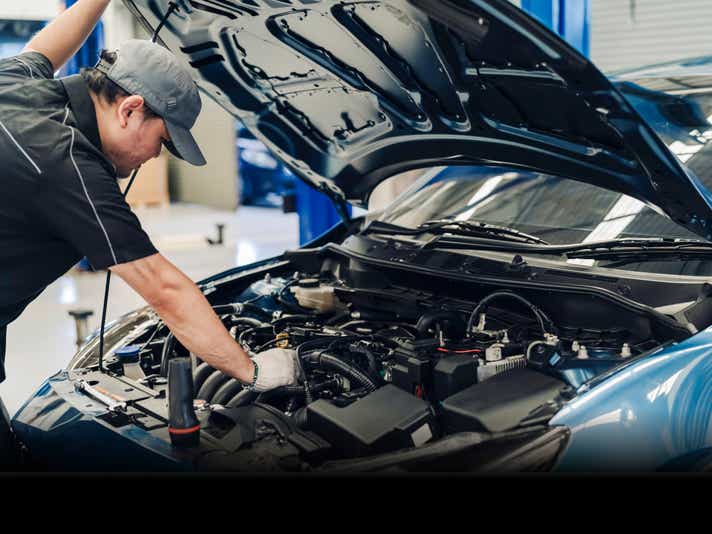

Everything you need to know about car service and maintenance
- 1Regular car maintenance is a key component of car ownership
- 2Modern vehicles give warning lights when key components have a fault
- 3A car’s service needs and requirements vary depending on the manufacturer
It is no secret that modern vehicles are complex feats of engineering. A seemingly random assortment of cables, switches, harnesses, nuts, bolts, and multiple computers come together harmoniously to make up the internals of a modern car. Aside from the ability to transport you in comfort, car manufacturers also set out to make these vehicles as reliable as they can be.
Much like the human body, though, even cars require frequent maintenance and service to ensure everything is running optimally. Periodically checking and maintaining your vehicle is a crucial component of car ownership and shouldn’t be overlooked or underestimated.
Given that, what are the key components of a vehicle that need to be looked over regularly? Can it be done at home by yourself, or is it advisable to head to your trusted mechanic for even the smallest of niggles? Car service and maintenance might seem like an overwhelming task, but as long as it’s done regularly and under professional guidance, the benefits are immeasurable in the long run. Our guide takes you through the key things to know about car maintenance and why the regular upkeep of your vehicle is a crucial ownership element.
Become a part of the official Cars24 auto community; CLUTCH, where we host lively auto discussions, updates, and more.
The importance of car maintenance
There are lots of good reasons to regularly maintain and service your vehicle. Doing so will keep your car in proper working order, which will help you avoid expensive mechanical repairs in the long run. Just how timely self-checkups are useful to identify any deficiencies and potential issues down the road, vehicles also require a similar level of maintenance to ensure everything is in optimum working order. What’s more, having a detailed service record will help increase your vehicle’s resale value when the time comes to upgrade your car.
Naturally, this requires a certain amount of discipline and investment of time and money, but this shouldn’t be a deterrent. If anything, the small investments you make every now and then are a great way to avoid major costs down the road because of a lack of regular service and neglect.
How often you should take your car in for a service
Every vehicle comes with a different set of guidelines regarding the periodicity of its service and maintenance. The best way to get a good understanding of how regular you should be with your car’s service is to look up the manufacturer’s recommendations online or in your vehicle’s owner manual.
That said, at the very least, you should have your car inspected by a trusted mechanic every 12 months to diagnose and solve any problems. Checking to ensure your car’s fluid levels are healthy, cleaning your vehicle’s filters, and rotating your tyres are just some of the basic things you should be regularly looking out for.
How to tell when your car needs a service

It is a fact that modern cars require less maintenance and service compared to older vehicles. This is down to ever-improving production methods and quality control done on behalf of vehicle manufacturers. Even so, it is not out of the ordinary to find a well-maintained car requiring service unexpectedly. In this situation, it is likely that the car will warn you of an imminent component failure, or if something needs tending to soon.
The easiest way to spot these warning signs is on your car’s instrument cluster. A couple of examples of these warnings can be the ‘Check Engine’ light going off, or a warning symbol to get your transmission diagnosed as soon as possible. Not all warnings come with a symbol flashing on your instrument cluster, though. If you notice any of the following, it’s best to consult a trusted mechanic at the earliest:
1) If your brakes feel spongy or repeatedly squeal when you press them, it’s likely that your brake pads need replacing or that some debris might be lodged in the rotors. The brakes are a critical component in ensuring passenger safety, so it should be diagnosed and rectified immediately after you notice something amiss.
2) If you feel like your car’s acceleration has dulled over time, it is likely a sign that your engine needs a tune-up or general maintenance. Your filters could be clogged or your spark/glow plugs might need replacing.
3) If your vehicle has difficulty starting up on cold mornings, or if it stalls repeatedly, it’s a sign that it’s time for a check-up. The issue could be battery- or engine-related, neither of which should be taken lightly.
4) If you’ve noticed your fuel efficiency dropping at an alarming rate despite you driving the same way you always have been, it’s likely that there’s something wrong with your fuel injectors and sensors. More often than not, it’s simply a matter of dirt accumulating, but it’s best to get it diagnosed soon to get your car back to normal health.
5) If you own a car with an automatic gearbox and have noticed that the shifts have gotten more pronounced or harsher, then there’s likely an issue with your transmission that needs fixing. This should be tended to immediately, as a replacement transmission can be very expensive.
These are just some of the things you should be on the lookout for. The point is to constantly keep an eye (and both ears) out to notice any irregularities while driving your vehicle.
Basic car maintenance tasks you shouldn’t ignore
All vehicles need frequent servicing to ensure they are running optimally. There are some components that need regular monitoring, and some you can inspect once every few months. Given that, here are a few basic car maintenance tasks you shouldn’t ignore:
1) Tyres: As the only parts of your car that’s actually in touch with the ground all the time, tyres make up a critical component of your driving experience. With that in mind, it becomes crucial to ensure that your tyres are in proper condition. For a start, always check whether your pressures are in line with what’s recommended by the manufacturer. If your car’s tyres are always properly inflated, this will help reduce tyre wear and even help increase fuel efficiency.
Your tyres’ tread depth is also something you should keep an eye out for. Bald or grained tyres will provide less grip, and it could lead to an accident if not addressed immediately. If you are unsure about what the tread depth should be, it is best to get it checked by a professional every three months.
2) Checking your car’s fluids is very important if you want your vehicle to run smoothly. More specifically, your vehicle’s engine oil and gearbox oil contribute massively when it comes to the smooth operation of your vehicle. Be sure to routinely check their levels, and replace/top-up as and when required. If you are not comfortable doing this yourself, it’s always recommended to get it done during your scheduled services.
3) If you spot any of your lights that aren’t functioning, it’s best to get them fixed immediately. Your vehicle’s headlamps, turn signals, and tail-lamps are, understandably, of key importance, so it’s recommended to keep a watchful eye out for any fused bulbs or cracked lights.
4) Windshield wiper blades are an underrated component of your car’s safety features list. Keep in mind that damaged or worn-out wipers will affect your visibility, and without perfect visibility, you will be endangering not just your passenger’s lives, but that of those on the road as well.
5) Your car’s battery falls under the umbrella of components that don’t require frequent maintenance. That said, if you notice flickering lights in your car, or if your car doesn’t start up like it used to, it’s probably an issue with the battery. While batteries are quite robust and durable nowadays, it’s best to let your mechanic give it a once-over every time your car goes in for a scheduled service.
Seasonal car care essentials

Similar to how our needs shift and evolve as seasons come and go, specific vehicle components need attention with varying weather conditions. In no particular order, here is a checklist of things you should look out for:
1) Windshield wipers aren’t something that need changing too often, but it is good to get them replaced every year or so, depending on their usage. The quality and condition of your wipers will affect your visibility out the front and back of your vehicle, so it is important to ensure that they’re functioning optimally.
2) In extreme temperatures, your car’s battery performance could be negatively affected. It’s a good idea to test the battery before and after the monsoons or during intense heat to ensure your vehicle doesn’t unexpectedly break down.
3) Tyre life should be constantly monitored. More importantly, not all tyres are suitable for dry and wet weather (including snow) conditions, so it’s best to check what your tyres are rated for.
Benefits of regular car maintenance

Regular car maintenance requires a certain degree of discipline and investment of time and money. That said, getting critical components of your vehicle regularly serviced brings with it a host of benefits. In no particular order, these include:
1) Reduced ownership cost: While it is true that regular maintenance will cost you time and money, it is also true that the timely diagnosis and rectification of small issues will very likely end up costing you much less than, say, a blown transmission or a dead engine because of neglect.
2) Regularly ensuring your spark/glow plugs are clean, and that your engine’s components are functioning optimally will help maintain your car’s performance and efficiency, with only a marginal drop-off to be expected as the years wear on.
3) Come the end of your ownership experience, a well-maintained, cared-for vehicle will always attract a higher resale value in comparison to one that’s been neglected and not serviced regularly.
4) Unexpected breakdowns are a lot less likely if you get your car serviced on a schedule and ensure all the components are inspected periodically.
5) Safety: Vehicle ownership is a joy as much as it is a responsibility, and a well-maintained car is a lot safer than one that’s been neglected. Your responsibility towards ensuring the key components of your vehicle (brakes, tyres, engine, and so on) are in optimal condition is something that shouldn’t be underestimated.
Conclusion
Regular car maintenance is something that should be the norm more than the exception. While it is true that modern cars are a lot more durable and reliable than older cars, their components still require periodic attention, and carefully monitoring their performance will be a big benefit to owners in the long run.
While it is true that some components of your vehicle don’t need as much periodic attention as others, it is always a good idea to give your entire vehicle a thorough scan from a trusted mechanic once a year (aside from the regular service schedules, that is).
FAQs
Q. What basic maintenance is required for my car?
Ensuring your car’s fluids are topped up, checking your battery, your wipers, your tyres and your lights should be the bare basics in terms of maintenance for your vehicle.
Q. What is the service checklist for 10,000 km?
Each car manufacturer has a different set of components that need to be checked at the 10,000 km mark. Your car’s owner manual will have an itemised list for the same.
Q. Why is it necessary to service a vehicle?
Regular car service is important because it serves to ensure that your car is running optimally. This will lead to fewer breakdowns and unnecessary expenses to replace components.
Q. What happens if I skip regular car service?
Your vehicle’s key components are likely to fail if your car’s scheduled services are neglected.
Q. How does seasonal weather affect car maintenance?
Car components like the battery, the wipers, the engine, and the tyres all have performance that is subject to weather. Car maintenance before a season change can help your car function optimally.





















